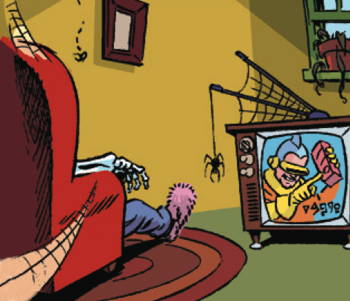September 2019
September 25, 2019
The family that threw away $100,000
This had to hurt. As far as I can tell, they never did find the lost money.I wonder if Doug faced any kind of punishment. Though arguably it's the mother's fault for storing such valuable financial documents in a laundry basket.

NY Daily News - July 3, 1970

Richmond Palladium Item - July 2, 1970
Posted By: Alex - Wed Sep 25, 2019 -
Comments (4)
Category: Money, 1970s
Robert Wadlow Centennial
We are a bit late with this, but it's still well worth the viewing.
Posted By: Paul - Wed Sep 25, 2019 -
Comments (1)
Category: Anniversary, Body, Differently Abled, Handicapped, Challenged, and Otherwise Atypical, Human Marvels
September 24, 2019
Reverse Smoking
In some parts of the world, people smoke cigarettes by holding the lit end inside their mouth. Apparently this doesn't burn them. In fact, reverse smokers claim that they enjoy the sensation of warmth it creates inside their mouth.
Journal of the American Dental Association - Mar 1976
Because reverse smoking has long been suspected of causing various dental problems, the most complete analyses of this habit are found in dental journals. I thought this discussion of it from a March 1976 article in the Journal of the American Dental Association contained some particularly interesting bits of info:
Reverse smoking has been reported to occur in the lower economic groups in areas of India, the Caribbean, Sardinia, South America, Korea, and the Philippine Islands. In the Philippine Islands, reverse smoking is referred to as “ bakwe” and is practiced almost exclusively by married women. It is a symbolic indication of the achievement of marital status and represents the responsibility that is peculiar to a married woman, in contrast to the carefree life-style of an unattached maiden. Many look on an unmarried smoker as a woman of easy virtue.
It is noteworthy that in parts of Korea women begin smoking on their 60th birthday, to represent the beginning of their retired life. This signifies wisdom and experience.
Motherhood and housework are the primary reasons why reverse smoking is practiced only by women. It enables the mother to feed and tend to her child without the risk of the infant touching the lighted end of the cigarette. It also eliminates the possibility of ashes dropping on children, eating utensils, clothing that is being washed, and food that is being prepared.
Reverse smokers give several other reasons for indulging in this peculiar habit: it is more pleasurable than conventional smoking; it gives one the feeling of warmth during the rainy season (This may explain why reverse smoking is practiced primarily in equatorial climates, which usually have a long rainy season.); there is no desire to inhale; and the cigarette or cigar lasts longer.
A study by Quigley and others reported that the average time for conventional smoking of a cigarette is four minutes and six seconds, whereas the average time for reverse smoking is seven minutes 42 seconds. Native reverse smokers may retain a single cigarette for as long as 18 minutes.

Journal of the American Dental Association - Apr 1966

Heavy tar buildup inside the mouth of a reverse smoker.
Journal of the American Dental Association - Oct 1964
Posted By: Alex - Tue Sep 24, 2019 -
Comments (3)
Category: Smoking and Tobacco, Teeth
Mammary Seasonings

Still for sale, as of this posting.
Posted By: Paul - Tue Sep 24, 2019 -
Comments (3)
Category: Body, Excess, Overkill, Hyperbole and Too Much Is Not Enough, Food, 1960s
September 23, 2019
Future Man
Back in the early 1980s, orthodontist David Marshall, from Syracuse, NY, liked to speculate about what humans would look like 2 million years in the future. Or what "Future Man" would look like, as he referred to our descendants. Based on previous trends in our evolution, he concluded that Future Man will be hairless, big-skulled, small-jawed, and have few teeth.I was going to say that 'Future Man' sounds like a great name for a comic or TV series. But when I googled the name, I discovered that there already is a Future Man series.
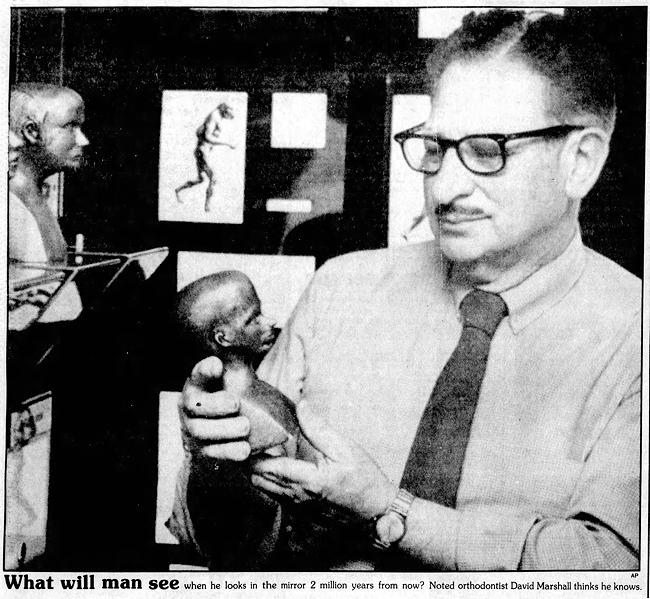
Spokesman Review - Jun 15, 1981
Today’s diet of soft, processed foods will take its toll on the human jaw and teeth, which have been diminishing since prehistoric days when our ancestors used their mouths as weapons, in addition to making tough foods palatable, Marshall says.
“Nature has a wonderful way of providing for her needs. Whatever she doesn’t need, she gets rid of,” Marshall says. “Things develop according to function. If you use something, it develops. If you don’t, it disappears.”
Since people today do not use their teeth the way they once did, future people probably will have much smaller, and fewer teeth, Marshall’s prediction indicates. They will be practically hairless and their jaws will diminish as they have for thousands of years, he says. The chin and nose will be more prominent.
The changes Marshall foresees also will give future people a wider range of facial expressions…
He has turned his office into a museum on the development of the human skull, tracing its evolutionary and embryonic progress in exhibits and photographs… One of the exhibits in his personal museum is a line of busts depicting the evolutionary changes in the human skull from prehistoric times to his vision of what people will look like 2 million years into the future…
But even with the possibility of scientific advances influencing evolution, Marshall expresses confidence that his projections cannot be disputed.
“No one is going to disprove me,” he says. “They won’t be around.”
-The Semi-Weekly Spokesman-Review - June 15, 1981
According to Marshall's obituary (he died in 2006), the anatomical museum he once had in his dental office was eventually moved to Syracuse University. Although I can't find any record of it there now.
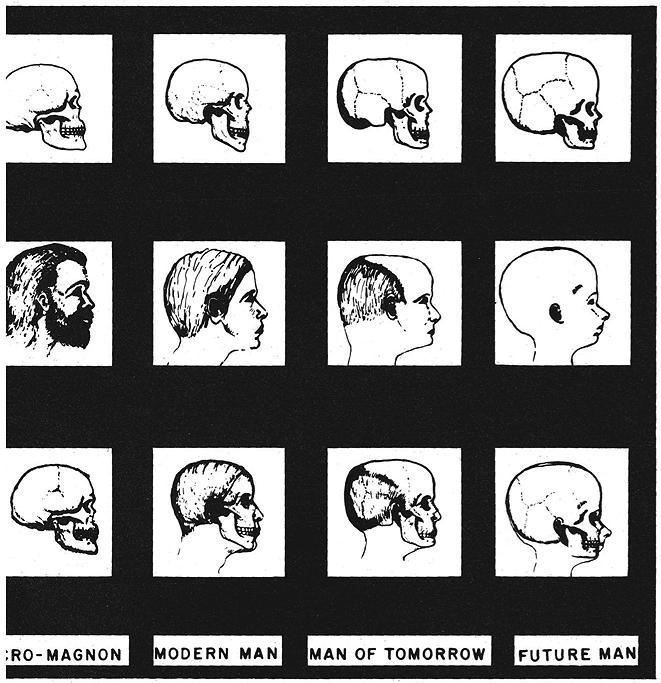
David Marshall, “Changes in the skull—past, present, and future—because of evolution.” Journal of the American Dental Association. Nov 1975.
Posted By: Alex - Mon Sep 23, 2019 -
Comments (4)
Category: Futurism, Predictions, Anthropology
Maestro
Maestro from Bloom Pictures on Vimeo.
Posted By: Paul - Mon Sep 23, 2019 -
Comments (2)
Category: Animals, Anthropomorphism, Music, Special Effects
September 22, 2019
Crawling as art
This weekend in New York City, artist Pope.L organized a “group crawl" along a 1.5 mile route from Seravalli Playground in the West Village to Union Square. 140 people participated. Pope.L wasn't one of them. He "walked alongside the crawlers for the duration of the performance, offering support and chatting with viewers."Over the years, however, Pope.L has personally done a lot of crawling... turning it into an artform. From his wikipedia page:
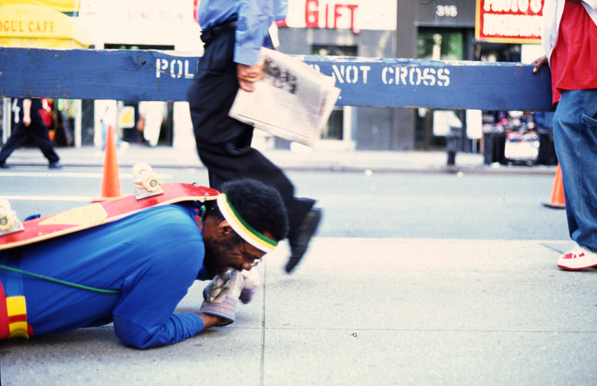
The Great White Way - source Wikipedia
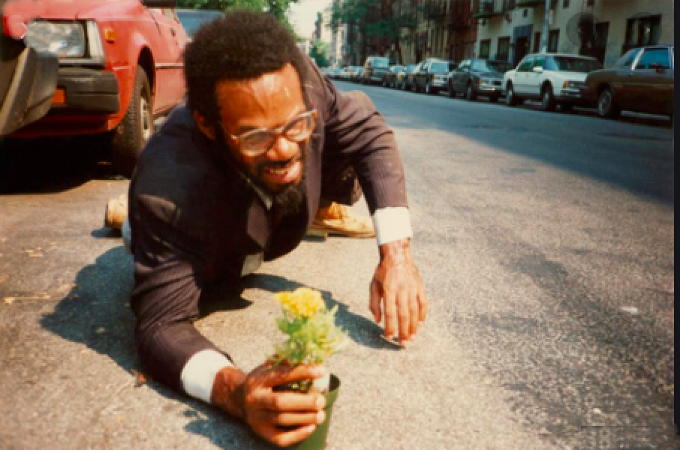
Tompkins Square Crawl (1991) - source Forbes
Posted By: Alex - Sun Sep 22, 2019 -
Comments (2)
Category: Performance Art
Follies of the Madmen #445
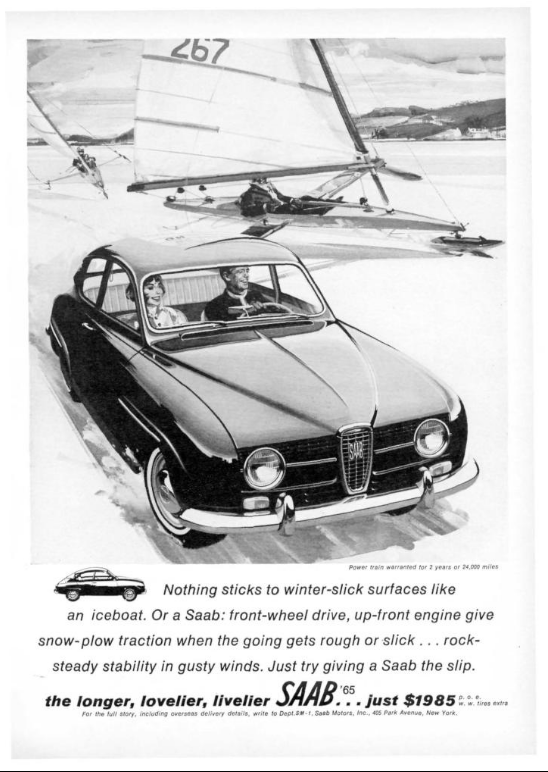
Yes, it's perfectly safe to drive your one-ton car on the same surface as the 150-lb iceboat.
Source.
Posted By: Paul - Sun Sep 22, 2019 -
Comments (6)
Category: Business, Advertising, Daredevils, Stuntpeople and Thrillseekers, Death, Sports, 1960s, Cars
September 21, 2019
Seeing-eye dog for a pigeon

Newsweek - Sep 24, 1951

Cumberland News - Sep 12, 1951
Posted By: Alex - Sat Sep 21, 2019 -
Comments (0)
Category: Pets, Dogs, 1950s
Steamboat Springs Ski Band
Can they be said to be a "marching" band, or not?Article here.
Posted By: Paul - Sat Sep 21, 2019 -
Comments (0)
Category: Music, Seasonal, Performance Art, Cacophony, Dissonance, White Noise and Other Sonic Assaults
| Get WU Posts by Email | |
|---|---|

| Who We Are |
|---|
| Alex Boese Alex is the creator and curator of the Museum of Hoaxes. He's also the author of various weird, non-fiction books such as Elephants on Acid. Paul Di Filippo Paul has been paid to put weird ideas into fictional form for over thirty years, in his career as a noted science fiction writer. He has recently begun blogging on many curious topics with three fellow writers at The Inferior 4+1. Chuck Shepherd Chuck is the purveyor of News of the Weird, the syndicated column which for decades has set the gold-standard for reporting on oddities and the bizarre. Our banner was drawn by the legendary underground cartoonist Rick Altergott. Contact Us |
